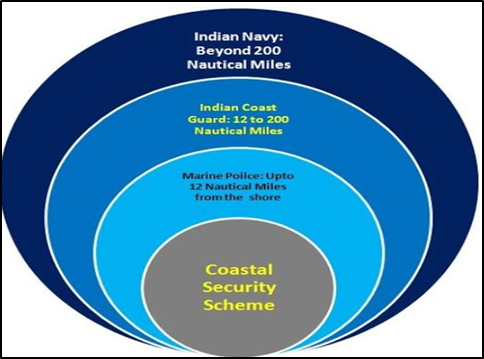In News:
- National Security Adviser (NSA) Ajit Doval participated in the first meeting of the Multi-Agency Maritime Security Group (MAMSG).
What’s in Today’s Article:
- India’s Maritime security – Importance, mechanism, issues
- Multi-Agency Maritime Security Group (MAMSG)
- News Summary
India’s Maritime security
Importance of maritime security
- Maritime security of vast coastlines
- India has along 7,516-km coastline, including island territories, and a 2 million sq km Exclusive Economic Zone.
- The importance of maritime security was evident following the 26/11 Mumbai terror attack.
- Economic and energy security
- 90% of India’s trade by volume and 70% by value transit through the seas.
- Strengthening the country’s maritime security is also necessary as India is focusing on becoming a blue economy.
- The Indian government is set to clear the Deep Ocean Mission for the blue water economy.
- Geostrategic Need
- China is penetrating into the Indian Ocean through Pakistan and Myanmar.
- Enhanced maritime security will give a boost to India’s SAGAR (Security and Growth of All in the Region) doctrine.
- Under this doctrine, India has envisioned a role of net security provider for itself in the IOR.
Mechanism
- Coastal border management was institutionalised in 2004 with the establishment of the Department of Border Management in the MHA.
- However, after the ‘26/11’ attacks, coastal and maritime security underwent a paradigm shift. These included:
- A three-tier security grid the Indian Navy, the coast guard, and the marine police;
- Increased electronic surveillance using Coastal radar chain, Automatic identification system (AIS), Vessel traffic management and information system
- Establishment of the National Command Control Communication and Intelligence (NC3I) Network;
- Sagar Prahari Bal for force security protecting of naval bases has been raised by Navy;
- Establishment of Information Fusion Centre – Indian Ocean Region (IFC-IOR).

Associated Issues
- There are no formal or commonly accepted definitions of concepts like ‘maritime security’, ‘coastal security’ and ‘coastal defence’. Sometimes, it leads to vagueness.
- Multiple institutions are involved and there is lack of coordination.
- Turf war between MHA and Ministry of Defence (MoD). Demands are being made to bring Coast Guard under the control of MHA.
- Fishermen are considered as the eyes and ears for coastal security. However, discontent among fishermen community, involvement of politics in fishermen issues etc. are further complicating the security architecture.
- Inadequate infrastructure, acute shortage of manpower is posing challenges in providing maritime security in India.
Multi-Agency Maritime Security Group (MAMSG)
- MAMSG was formed in November 2021 with an aim to develop better coordination between different maritime security agencies and ministries of the country.
- It works directly under the National Security Council secretariat (NSCS).
- The National Security Council is a three-tiered organization consisting of Strategic Policy Group (SPG); the National Security Advisory Board (NSAB) and the National Security Council Secretariat.
- The council oversees political, economic, energy and security issues of strategic concern.
- NSA is the Chairperson of NSCS.
- In February 2022, G Ashok Kumar was appointed as India’s first Coordinator of MAMSG – also known as national maritime security coordinator.
- It has the responsibility of coordinating between all the agencies involved in maritime security and maritime civil issues as well.
- He will be the principal advisor to the government on maritime security domain and will act as a nodal point for all issues related to maritime security.
Role
- The MAMSG is envisaged to
- provide a standing and effective mechanism to ensure coordination of all aspects of maritime security including coastal and offshore security, and
- fill the institutional, policy, technological and operational gaps in meeting present and future security challenges.
- The group will also address maritime contingencies requiring an urgent and coordinated response
News Summary
- While addressing the first-ever meeting of the MAMSG, NSA Doval called for seamless coordination among various agencies involved in protecting India's maritime interests.
- The meeting was chaired by Vice Admiral G Ashok Kumar (retd), the country’s first National Maritime Security Coordinator.
Key Highlights
- Indian Ocean is now witness to rivalries and competitions
- In the changing geopolitical scenario, the Indian Ocean, which has been an ocean of peace, is gradually becoming competitive.
- The region has the potential to witness clash of interests. Hence, India needs to be vigilant in order to protect its interests.
- Security at the high seas and economic wellbeing is inextricably linked
- He said security at the high seas and economic wellbeing is inextricably linked and all stakeholders must work unitedly.
- The more India develops, the more assets it creates, greater would be the vulnerability and the need for security in the maritime domain.
- India will not be able to become the power it deserves to be unless it has a very strong maritime system.
- Maritime borders are different from land borders
- One cannot fence the maritime borders, and that disputes in seas are resolved through international norms and laws, while land disputes are bilateral in nature.










